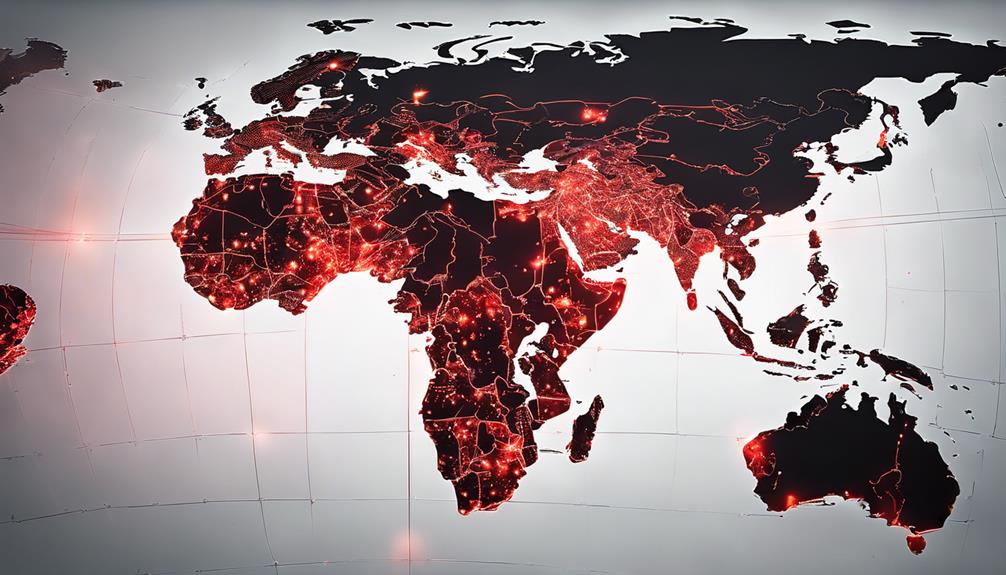Have you ever considered the impact of a single weak link in the AI chip manufacturing sector?
The recent TED talk by Rob Toews sheds light on this critical issue, prompting us to reassess the stability of the global AI ecosystem.
As we ponder the potential risks and vulnerabilities associated with TSMC’s dominant position, we are compelled to contemplate the future scenarios that could unfold in the ever-evolving landscape of AI chip production.
What measures are being taken to address this precarious situation, and what alternatives exist to safeguard against unforeseen disruptions?
Key Takeaways
- TSMC’s dominance in AI chip production poses a global single point of failure.
- Geopolitical tensions threaten Taiwan’s semiconductor industry, impacting AI development.
- Transition from TSMC to Samsung for chip production would be time-consuming.
- Intel’s challenges and the global AI chip manufacturing landscape highlight the need for diplomatic solutions.
TSMC’s Dominance in AI Chip Industry
TSMC’s unparalleled dominance in the AI chip industry is underscored by its production of all advanced AI chips, a result of our strategic investments totaling $100 billion in cutting-edge fabrication capabilities. As one of the three leading chip manufacturers globally, our deep partnerships across the supply chain and unrivaled specialization in chip production have solidified our position.
The economies of scale and network effects we possess further cement our market capitalization at $470 billion. This dominance not only signifies our technological prowess but also raises important questions about the concentration of power in the semiconductor industry.
As we continue to push boundaries in AI chip production, it’s crucial to ensure that such dominance doesn’t compromise the principles of freedom, innovation, and fair competition.
Geopolitical Concerns and TSMC’s Role

With increasing global tensions affecting semiconductor manufacturing, the strategic positioning of TSMC in the AI chip industry emerges as a critical focal point for geopolitical discussions. The US banning the export of high-end AI chips to China and aiming to reduce reliance on East Asia for chip fabrication underscores the geopolitical concerns. TSMC’s plans to build fabs in the US to mitigate risks show a proactive approach.
However, the limited production capacity of TSMC’s Arizona fabs raises questions about the potential impacts of geopolitical conflicts on AI chip production. Taiwan’s role as a ‘silicon shield’ in the semiconductor industry adds complexity to the geopolitical landscape, emphasizing the need for a nuanced understanding of the implications of such geopolitical tensions on the AI chip industry.
Potential Impacts of China-Taiwan Conflict on AI Chip Production
In the event of a conflict between China and Taiwan, the disruption to AI chip production could have far-reaching consequences for the global technology landscape. This potential scenario raises critical considerations for the AI industry and beyond.
- TSMC’s fabs would likely be inoperative in case of invasion.
- TSMC’s fabs may be destroyed to prevent control by China.
- Leading-edge chip production would cease if TSMC’s fabs go offline.
- Samsung is the only potential alternative for advanced chip production.
These outcomes underscore the delicate balance in the semiconductor industry and highlight the need for diversified manufacturing capabilities to uphold freedom and innovation in AI technology.
Future Scenarios and Considerations in AI Chip Industry

Considering the potential ramifications of geopolitical tensions on AI chip production, our analysis delves into various future scenarios and critical considerations within the industry.
In an uncertain landscape, the protection of Taiwan’s semiconductor industry becomes pivotal for ensuring a smooth continuation of advanced AI chip production. The possibility of TSMC’s fabs going offline poses a significant global risk, highlighting the industry’s vulnerability to a single point of failure.
While Samsung could potentially step in to fill the void, the transition would undoubtedly require substantial time and resources. The looming shadow of geopolitical tensions casts a veil of uncertainty over the future of AI development, emphasizing the need for diversification and resilience in the global AI ecosystem.
Intel’s Challenges and Global AI Chip Manufacturing Landscape
Intel’s challenges in navigating the rapidly evolving global AI chip manufacturing landscape reflect the intricate balance between technological innovation and strategic partnerships.
- Intel struggled with advanced node technology transition.
- Outsourced production to TSMC.
- Aims for two-nanometer chip production by 2024.
- Leading AI chips manufactured in Taiwan.
As Intel grapples with these challenges, the global AI ecosystem must adapt to potential disruptions in chip manufacturing.
Maintaining diplomatic relations and fostering technological advancements are crucial to ensure a stable supply chain and continued progress in AI development.
The interplay between industry shifts and geopolitical dynamics underscores the need for resilience and collaboration in the ever-changing landscape of AI chip production.
Frequently Asked Questions
What Are the Specific Technological Advancements That TSMC Has Made in the Field of AI Chip Production?
In the field of AI chip production, TSMC has made significant technological advancements. Their innovations include cutting-edge fabrication capabilities, deep partnerships in the supply chain, and unrivaled specialization in chip production.
TSMC’s dominance is attributed to economies of scale and network effects, allowing them to produce all advanced AI chips. These advancements position TSMC as a key player in shaping the future of AI technology.
How Does Tsmc’s Investment in Fabrication Capabilities Compare to That of Other Leading Chip Manufacturers?
In comparison to other leading chip manufacturers, TSMC’s investment in fabrication capabilities is unparalleled.
With a staggering $100 billion allocated to enhancing its production capabilities, TSMC solidifies its dominance in the AI chip industry.
This substantial investment not only showcases TSMC’s commitment to innovation but also cements its position as a frontrunner in the competitive world of chip manufacturing.
What Are Some Examples of the Deep Partnerships TSMC Has Formed Across the Supply Chain?
In our industry, TSMC has cultivated strategic partnerships that span the supply chain. Collaborations with design firms, equipment suppliers, and research institutions have bolstered TSMC’s technological advancements and market influence.
These deep relationships ensure a seamless flow of resources, expertise, and innovation, reinforcing TSMC’s position as a key player in the AI chip industry. Such alliances showcase the power of collaboration in driving progress and sustaining competitive edge.
How Would the Destruction of Tsmc’s Fabs Impact the Global AI Ecosystem Beyond Just Chip Production?
If TSMC’s fabs were destroyed, the global AI ecosystem would face catastrophic disruptions beyond mere chip production. The loss of TSMC’s advanced capabilities could create a domino effect, impacting AI development, innovation, and industries worldwide.
The interconnectedness of technology means that a single point of failure could reverberate across economies and societies. It underscores the need for diversified and resilient supply chains in the AI landscape.
What Are the Potential Consequences of Intel’s Struggles With Transitioning to Advanced Node Technologies on the Global AI Chip Manufacturing Landscape?
Intel’s challenges transitioning to advanced node technologies could disrupt the global AI chip manufacturing landscape. Outsourcing production to TSMC shows Intel’s struggle to keep pace.
Delays in producing two-nanometer chips by 2024 may impact AI development. Taiwan’s dominance in AI chip manufacturing means Intel’s setbacks could lead to supply chain vulnerabilities.
Maintaining diverse production capabilities is crucial to avoid a single point of failure in the global AI ecosystem.
Conclusion
As we navigate the intricate landscape of AI chip manufacturing, we’re reminded of the delicate balance that underpins this critical industry.
Just like a spider weaving its intricate web, TSMC’s dominance serves as a single point of failure in the global AI ecosystem.
The potential disruption caused by geopolitical tensions highlights the need for diversification and strategic planning to ensure the resilience of AI chip production in the face of uncertainty.









